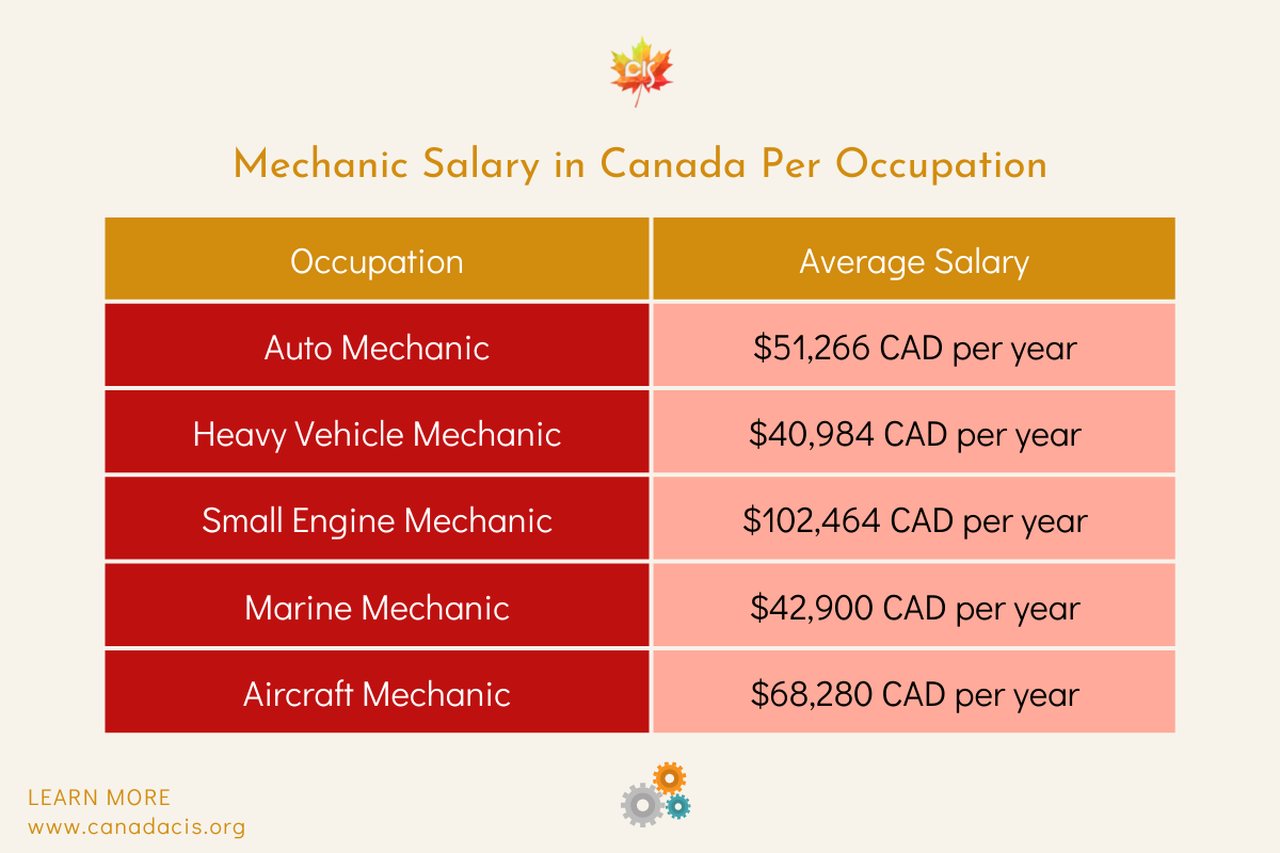A Foreign Workers' Manual for Jobs in Canada for Mechanics
Home » Blog » Jobs in Canada for Foreigners » Jobs in Canada for Mechanics: Guide for Foreign-Workers
Many people dream of working as auto mechanics in one of the world’s most advanced mechanical nations. Nothing beats making a living fixing up cars you love while satisfying your passion for the business.
Finding meaningful work in Canada is gratifying in and of itself, but the automotive business in Canada offers several perks that are unavailable in any other country!
Continue reading to find out why it’s a good idea to find jobs in Canada for mechanics and and which immigration pathways are best for you.
Table of Contents
⚙️ Jobs in Canada for Mechanics: Types and Requirements
There are several job types for mechanics in Canada to choose from! Depending on your work experience you will need to choose the best available occupancy for you, do take note that for mechanical jobs such as Automotive service technicians, truck and bus mechanics and mechanical repairers, the TEER Code is: 72410.
Click to learn more about top jobs in Canada for foreigners.
Job Description:
A car mechanic is someone who works on and repairs broken or worn out auto components for paying clients. Car and truck mechanics are responsible for fixing mechanical issues, determining the cause of such issues, and conducting routine maintenance on the vehicles they operate on.
Requirements:
- Start your apprenticeship by signing up with your state’s occupational licensing board.
- Participate in a recognized trade or vocational school’s training program.
- Work a certain number of hours at your employer’s vehicle repair business and attend class for a fixed number of hours.
- Take and successfully pass any and all tests.
Job Description:
Heavy vehicle mechanics are responsible for the repair, maintenance, and testing of large vehicles, engines, and other mechanical components. Truck and bus mechanics also work on generators, pumps, compressors, and drilling rigs among other heavy gear.
Requirements:
- Ability to lift heavy objects up to 50lbs and should be in overall good physical health.
- Apprenticeship in small engine or equipment maintenance lasting three to four years or;
- Numerous years of experience working in the trade
- A trade certification that requires some formal education beyond high school or college
Job Description:
Technicians that specialize in small engines repair anything from snowmobiles to chain saws. When machinery malfunctions, technicians use a wide variety of techniques to determine the nature and amount of the damage. Technicians that work on small engines diagnose and fix issues with the engine’s moving parts, wiring, and fuel supply.
Requirements:
- Apprenticeship in small engine or equipment maintenance lasting three to four years or;
- Numerous years of experience working in the trade
- A trade certification that requires some formal education beyond high school or college
Job Description:
Boat mechanics, or marine mechanics, are experts in maintaining and repairing the mechanical and electrical systems of boats. They are responsible for the upkeep and repair of all ship engines, from little outboard motors to massive diesel engines.
Requirements:
- Apprenticeship in motorboat equipment maintenance lasting three to four years/ high school diploma or;
- 5 years of experience working in the trade
Job Description:
Troubleshooting and inspecting mechanical, hydraulic, and structural systems is the job of an aircraft mechanic. They fix planes by using power and manual instruments (such saws and grinders). Repairs include things like leaking wings and dripping roofs. Compliance with aviation safety laws is another responsibility of aircraft mechanics.
Requirements:
- A High School Diploma
- Acquire a Transport Canada-approved AME basic training program (an AME must begin with a curriculum that has been authorized by Transport Canada)
- Compile your years of experience in civil aviation repair.
- Acquire the necessary expertise by practicing a variety of aircraft mechanical procedures.
🛠️ Immigration Programs Best for Mechanics
It’s possible to apply for and get employment in Canada via more than 80 different pathways. But which of them is the most suitable for foreign mechanical specialists seeking employment in Canada? Below are three of the top choices for you:
In order to get permanent residence in Canada as quickly as possible, this immigration procedure is your best bet if you work in the mechanical field.
To become eligible for programs like the Federal Skilled Worker Program (FSWP), you may use Express Entry.
To qualify for the FSWP track, you’ll need a minimum of 67 points.
The Provincial Nominee Program is an additional advantageous route to getting jobs in Canada as a mechanic.
This program is designed for highly qualified mechanics who are interested in contributing their expertise and experience to the economic development of a specific Canadian province.
As a participant in this program, you must be able to demonstrate that you will contribute a positive impact towards the province’s economy for you to qualify for permanent residence.
The Global Talent Stream is a good fit if you’re a skilled mechanic who wants to settle in Canada on a temporary basis.
💰 What is the Average Canadian Salary for a Mechanical Employee?
In Canada, a Mechanic can expect a yearly salary of around $44,600. Mechanic pay may range widely depending on factors including education level, industry, employer, and location.
For each mechanic occupation, we’ve provided their average wage per year:
❓ Frequently Asked Questions about Mechanic Jobs in Canada
The need for skilled mechanics is high in the current Canadian economy. There will always be a need for your skill set in this nation, whether you work in a car dealership or the marines.
Competence as an Automotive Service Technician typically requires 7,220 hours (about four years) of study and employment, including 6,500 hours of on-the-job experience and 720 hours of classroom instruction.
The greatest places to find jobs in Canada for mechanics right now are Alberta and British Columbia.







